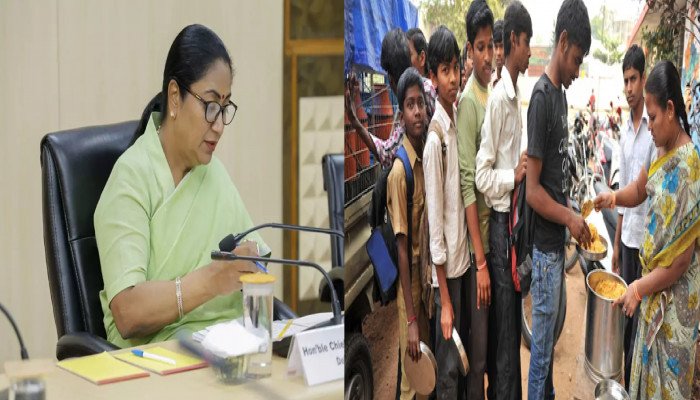Revolutionary food initiatives reach Delhi as CM Rekha Gupta unveils plans for affordable dining options citywide. The Atal Canteens program promises complete meals at incredibly low prices for hardworking citizens across the capital. This groundbreaking announcement came during Independence Day celebrations, marking a significant shift toward worker welfare programs.
Understanding the Atal Canteens Initiative Details
Delhi’s newest welfare program aims to provide nutritious meals at subsidised rates for the city’s workforce. The ₹5 pricing structure makes healthy food accessible to construction workers, domestic helpers, and other daily wage earners. Each canteen will serve complete meals including rice, vegetables, bread, and lentils during lunch hours.
Chief Minister Rekha Gupta emphasised the program’s focus on dignity and nutrition rather than charity approaches. Workers can enjoy fresh, hygienic meals without feeling stigmatised or dependent on handouts from others. The initiative reflects the Delhi government’s commitment to supporting the backbone of the city’s economy effectively.
Location selection prioritises areas with high concentrations of blue-collar workers and construction sites throughout Delhi. Initial plans include establishing canteens near metro construction zones, industrial areas, and residential complexes under development. The strategic placement ensures maximum accessibility for the target beneficiary groups.
Implementation Strategy and Timeline Overview
The rollout begins with pilot locations across three districts before expanding to cover all Delhi areas. Government officials estimate the first phase will serve approximately 10,000 workers daily through strategically placed facilities. Full implementation across Delhi could benefit over 100,000 workers within twelve months of launch.
Partnership agreements with local NGOs and private organisations will help manage daily operations efficiently. These collaborations ensure sustainable service delivery while maintaining quality standards across all canteen locations consistently. Training programs for staff emphasise food safety, hygiene protocols, and respectful customer service approaches.
Budget allocations from Delhi’s welfare fund will subsidise the significant difference between actual costs and prices. The government estimates spending approximately ₹50 crores annually to maintain the program’s financial sustainability long-term. This investment demonstrates a serious commitment to worker welfare and social equity goals.
Target Beneficiaries and Eligibility Requirements
The program specifically targets daily wage earners, construction workers, domestic help, and other informal sector employees. Registration processes remain simple, requiring basic identification documents and proof of employment in eligible categories. Workers from neighbouring states working in Delhi also qualify for the program benefits.
Eligible worker categories include:
- Construction and infrastructure project employees
- Domestic workers and household help staff
- Street vendors and small business operators
- Security guards and maintenance personnel
- Delivery workers and transportation helpers
Priority registration goes to women workers, senior citizens, and workers supporting large families on limited incomes. Special provisions ensure pregnant women and nursing mothers receive additional nutritional support through enhanced meal options. The inclusive approach addresses diverse needs within Delhi’s informal workforce community.
Nutritional Standards and Menu Planning
Each full meal contains balanced nutrition meeting recommended daily requirements for adult workers engaged in physical labour. Registered dietitians design menus incorporating seasonal vegetables, whole grains, and protein sources for optimal health benefits. Weekly menu rotations prevent monotony while ensuring variety in taste and nutritional content.
Quality control measures include regular health inspections, ingredient sourcing verification, and customer feedback collection systems. Fresh vegetables come from local suppliers to support regional farmers while ensuring ingredient freshness and quality. Cooking methods emphasise traditional techniques that preserve nutritional value and authentic flavours.
Special dietary accommodations address religious preferences, allergies, and medical conditions affecting food choices for workers. Separate cooking areas maintain vegetarian and non-vegetarian meal preparation to respect diverse cultural backgrounds. The comprehensive approach ensures every eligible worker finds suitable meal options available.
Economic Impact on Delhi’s Workforce
The ₹5 meal pricing represents significant savings for workers typically spending ₹30-50 daily on lunch expenses. Monthly savings could reach ₹900-1,350 per worker, substantially improving household budgets for essential needs like healthcare and education. These financial benefits directly improve living standards for thousands of families.
Reduced meal costs enable workers to allocate resources toward skill development, children’s education, and emergency healthcare needs. The ripple effects extend beyond individual families to strengthen entire communities through improved economic stability. Local businesses may also benefit from increased consumer spending power among worker populations.
Healthcare costs could decrease as workers access nutritious meals regularly instead of relying on cheap, unhealthy alternatives. Better nutrition leads to improved productivity, fewer sick days, and enhanced overall well-being for the workforce. These health benefits create positive cycles of economic improvement and social development.
Comparison with Similar Programs Nationwide
Several Indian states have implemented comparable subsidised meal programs with varying degrees of success and sustainability. Tamil Nadu’s Amma Canteens serve as a successful model, providing affordable meals to urban poor populations effectively. Telangana’s Anna Canteens also demonstrate successful implementation of subsidised food programs for workers.
Delhi’s program incorporates lessons learned from other states while addressing specific local needs and challenges. The pricing structure remains among the most affordable nationwide, reflecting the Delhi government’s ambitious welfare commitments. Enhanced quality standards and strategic locations differentiate this program from existing alternatives.
Long-term sustainability plans include exploring public-private partnerships and community involvement to reduce government financial burden. Revenue generation through catering services for government events could supplement program funding while maintaining core objectives. These innovative approaches ensure program longevity beyond political changes.
The Atal Canteens initiative represents a significant step toward addressing food security and worker welfare in India’s capital city. As implementation proceeds, monitoring systems will track impact on worker health, productivity, and overall quality of life improvements.








Be First to Comment